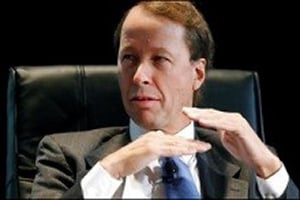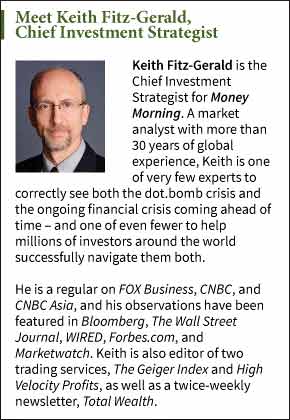The federal government and Wall Street are at it again, scratching each other's backs at your expense...
They did it in 1999, when the government repealed Glass-Steagall - and opened the door leading to the Financial Crisis.
They did it in September 2008, when the Treasury Department loaned Wall Street banks $700 billion of U.S. taxpayer money to bail them out from their own misdeeds, many of which stemmed from repealing Glass-Steagall.

And yet again in 2010 when they passed Dodd-Frank, a reform that was meant to reign in excesses but which has actually further concentrated Wall Street's grip.
And now these two institutions are pushing to socialize your retirement savings accounts...
This isn't just some far-off hypothetical scenario.
Wall Street may get its meat hooks into your nest egg as soon as next year.
At least if private-equity leviathan Blackstone Group LP (NYSE: BX) CEO Tony James has anything to say about it.
You see, James has a working theory about what to do with the U.S. retirement system that currently charges participants large 401(k) and 403(b) asset and consulting percentage fees...
"Managing [retirement accounts] in a pooled fashion would let [retirees] leverage that scale to pay lower fees," James said in a March 15 interview with Bloomberg, according to International Business Times on Oct. 19. "They would also have access to [the] highest-quality managers who could adopt long-term investment horizons and invest in less liquid, but higher returning, asset classes that are more appropriate for retirement funding."
What James is suggesting here is socializing U.S. workers' retirement plans...
Introducing Uncle Sam's Plan to Socialize Your Retirement
A year ago on Oct. 21, 2015, James and labor economist Teresa Ghilarducci proposed the "Guaranteed Retirement Account" (GRA) plan.
Designed to be a government-sponsored retirement savings initiative, the GRA would require workers and employers to put 3% of payroll funds into individual retirement accounts. These accounts would then be run by "professional investment managers" -- as James himself put it in an interview with The New York Times on Dec. 11, 2015. Individual voluntary 401(k)s would be replaced by a "single government-sponsored national system."
In other words, you'll be forced to hand over your retirement funds, and you'll have no say in selecting the people who invest it.
Much of the money going into James' proposed government-mandated GRAs would flow directly to Wall Street, where companies like - surprise! - Blackstone Group could profit big time off these assets.
Must Read: How Small Investors Can Take on Wall Street... and Win
James and Ghilarducci's pitch last year garnered immediate praise from the media. The New York Times, USA Today, and CNBC commended them for their economic inventiveness. Bloomberg's report came out with the title, "Blackstone's Tony James Wants to Help You Retire."
In short, the GRA plan was packaged as a program that would help millions of Americans prepare for their futures so that one day they could live comfortably into their golden years.
 You'll remember this was precisely how President Barack Obama's "Affordable Care Act" proposal was presented by the media in 2010 - as a saving grace for swaths of Americans who couldn't afford private insurance. [Editor's Note: While the Affordable Care Act has helped millions of low-income Americans get medical care, middle-class citizens who have signed up for Obamacare plans are getting crushed financially. Here's more...]
You'll remember this was precisely how President Barack Obama's "Affordable Care Act" proposal was presented by the media in 2010 - as a saving grace for swaths of Americans who couldn't afford private insurance. [Editor's Note: While the Affordable Care Act has helped millions of low-income Americans get medical care, middle-class citizens who have signed up for Obamacare plans are getting crushed financially. Here's more...]
Six years later... well... just look at how the ACA is "thriving." After all, 2 million people enrolled in the program make too much money for subsidies. Meanwhile, premium costs are set to soar in 2017, while the program itself becomes more and more monetarily unsustainable.
In order to get a better perspective on how James' GRA would affect your retirement, Money Morning sat down with an expert on the matter: our own Chief Investment Strategist Keith Fitz-Gerald.
Never one to mince words, his take may shock you.
Here's why Fitz-Gerald thinks GRAs will be the greatest "government-sanctioned robbery" in the history of mankind...
[mmpazkzone name="in-story" network="9794" site="307044" id="137008" type="4"]
What GRAs Mean for Your Retirement: "Sanctioned Robbery"
Money Morning: Keith, can the situation really be that bad?
Keith Fitz-Gerald: Unfortunately, yes. Being forced to invest in a GRA that's, in turn, managed by Wall Street's biggest firms is a lot like inviting a piranha to dinner... only you and your money are on the menu.
MM: President-elect Trump is pro-business and makes no bones about reigning in Wall Street. Do you think he'd condone something like the GRA program?
KFG: I don't believe he'll have a choice. Congress is going to present this to the American people as something that's in their best interest, which puts him in the unenviable position of either having to say they're full of it and GRAs are a bad idea, or that he's not interested in America's future -- which would run against his entire platform.
Financial repression is about the only tool the government has left if it intends to keep spending money it doesn't have, and Congress will do whatever it takes to perpetuate the illusion that it's come up with this scheme to "help."
MM: So what is the true purpose of James' proposal?
KFG: It's unabashedly in Wall Street's self-interest. I view the GRA as the biggest asset grab in recorded history. What's really insidious about this is that the proposal will be sold to a naïve public who will be led to believe that it's going to help them save, when all it's really doing is lining up trillions of dollars for Wall Street.
MM: Why would Wall Street do such a thing?
KFG: It used to be that the capital markets reflected private risk for private gain and private losses. Now - thanks to the bailouts - the equation is different. Now it's private gains and public risk because taxpayer dollars guarantee against failure.
This is why, for example, Goldman Sachs Group Inc. (NYSE: GS) suddenly went into consumer banking this year after years of avoiding it - because that way it is guaranteed a bailout. If GS stayed a trading shop with no consumer deposits (at risk), it would be at the back of the line.
Managing retirement assets ensures that Wall Street "can't fail," which is why I expect every asset manager who understands the concept of private gain and public risk to fight tooth and nail for a piece of the action.
MM: How will this impact our readers?
KFG: In a number of ways.
First, Uncle Sam will likely become one of the largest -- if not the largest -- stock market players. That means that front-running the government becomes a viable investment input that's every bit as important as earnings, revenue, and sales are today when it comes to analyzing potential investments.
Second, bigger companies will move first because they're the investments with the scale to absorb such a liquidity rush. You'll still have great small-cap choices to play with, but the inputs will be different -- which is why something like Sid's Delta Factor analysis will give savvy investors a real advantage.
Third, volatility will rise. As the amount of capital chasing fewer quality stocks goes up, the number of outstanding shares falls, and that means volatility skyrockets. That's going to catch a lot of people by surprise because it's so counter-intuitive.
MM: The implications are staggering. Do you really think the government will enforce James' GRA plan in the near future?
KFG: Yes, or some variation of it. And probably a lot sooner than most people expect. I'm watching the situation very, very carefully and will be in touch with our readers as it continues to develop.
MM: Thank you very much.
KFG: My pleasure.
Up Next: A Way to Beat the Markets 30-Fold
Keith Fitz-Gerald has guided his paid subscribers to more than 400 double- and triple-digit winners over the years, with peak gains like 629% on Celldex and 300% on Golar.
And it all comes down to a simple two-step approach.
This year alone, average gains of 30.26% have crushed the broader market.
Click here to find out for yourself how it works…
For the latest information on retirement savings and how Uncle Sam's policies will affect your nest egg, follow us on Twitter @moneymorning or on Facebook.
Related Articles:
- The New York Times: Pushing Aside 401(k)'s for Mandatory Savings Plans
- Money Morning: Obamacare Facts: "We Have Insurance, but We Can't Afford to Use It"
- Money Morning: Obamacare Failures Tear Apart Government-Insurer Partnership
- Money Morning: How a Hillary Clinton Presidency Throws U.S. Workers to the Wolves


